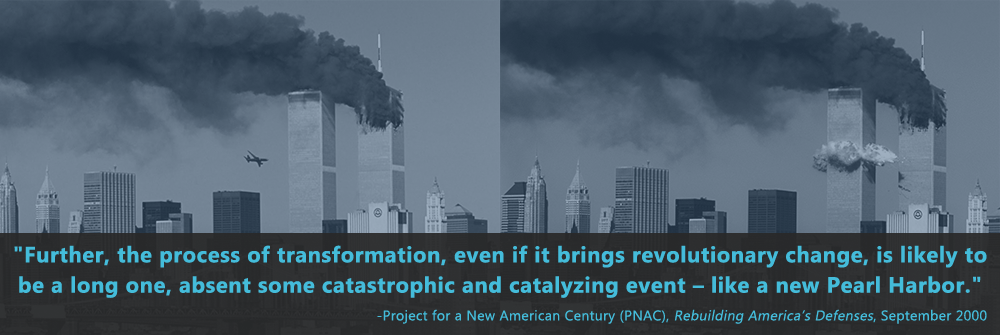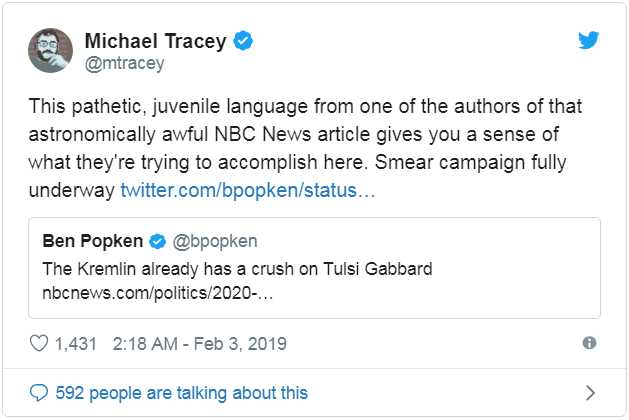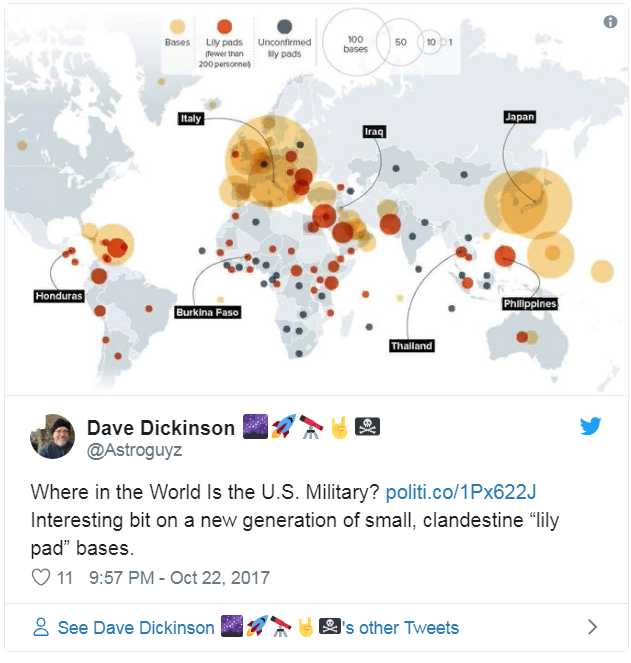Caitlin JOHNSTONE
When Hawaii congresswoman Tulsi Gabbard announced her candidacy for the presidency on CNN last month, I had a feeling I’d be writing about her a fair bit. Not because I particularly want her to be president, but because I knew her candidacy would cause the narrative control mechanizations of the political/media class to overextend themselves, leaving them open to attack, exposure, and the weakening of their control of the narrative.
Mere hours before her campaign officially launched, NBC News published an astonishingly blatant smear piece titled “Russia’s propaganda machine discovers 2020 Democratic candidate Tulsi Gabbard,” subtitled “Experts who track websites and social media linked to Russia have seen stirrings of a possible campaign of support for Hawaii Democrat Tulsi Gabbard.” One of the article’s authors shared it on Twitter with the caption, “The Kremlin already has a crush on Tulsi Gabbard.”
The article reported that media outlets tied to the Russian government had been talking a lot about Gabbard’s candidacy, ironically citing as an example an RT article which documented the attempts by the US mainstream media to paint Gabbard as a Kremlin agent. The article’s authors cited the existence of such articles combined with the existence of “chatter” about Gabbard on the anonymous message board 8chan (relevant for God knows what reason) as evidence to substantiate its blaring headline. Even more hilariously, the source for its weird 8chan claim is named as none other than Renee DiResta of the narrative control firm New Knowledge, which was recently embroiled in a scandal for staging a “false flag operation” in an Alabama Senate race which gave one of the candidates the false appearance of being amplified by Russian bots.
This article is of course absurd. As we discussed recently, you will always see Russia on the same US foreign policy page as anti-interventionists like Tulsi Gabbard, because Russia, like so many other nations, opposes US interventionism. To treat this as some sort of shocking conspiracy instead of obvious and mundane is journalistic malpractice. There are many, many very good reasons to oppose the war agendas of the US-centralized empire, none of which have anything to do with having any loyalty to or sympathies for the Russian government.
But we will continue to see this tactic used again and again and again against any and all opposition to US-led interventionism for as long as the Russiagate psyop maintains its grip upon western consciousness. And make no mistake, these smears have everything to do with anti-interventionism and nothing to do with Russia. There will never, ever be an antiwar voice who the political/media class and their centrist followers espouse as good and valid; they’ll never say “Ahh, finally, someone who hates war and also isn’t aligned with Russia! We can get behind this one!” That will never, ever happen, because it is the opposition to war and interventionism itself which is being rejected, and in the McCarthyite environment of Russia hysteria, tarring it as “Russian” simply makes a practical excuse for that rejection.
All the biggest conflicts in the world can be described as unipolarism vs multipolarism: the unipolarists who support the global hegemony of the US-centralized empire at any cost, versus the multipolarists who oppose that dominance and support the existence of multiple power structures in the world. The governments of Russia, China, Iran and their allies are predominantly multipolarist in their geopolitical outlook, and they tend to be more in favor of non-interventionism, since unipolarity can only be held in place by brute force and aggression. Unipolarists, therefore, can always paint western anti-interventionists as Russian assets, since the Russian government is multipolarist and opposed to the interventionism of the unipolarists.
The nonstop propaganda campaign to keep the coals of Russia hysteria burning white hot at all times can therefore be looked at first and foremost as a psychological operation to kill support for multipolarism around the world. It can of course be used to manufacture consent for escalations against Russia, China, Syria, Venezuela, Iran etc as needed, but it can also be used to attack the ideology of anti-interventionism itself by smearing anyone who opposes unipolar oppression and aggression as an agent of a nefarious oppositional government.
The social engineers have succeeded in constructing a narrative control device which encapsulates the entire agenda of the unipolar world order in a single bumper sticker-sized talking point: “Russia opposes Big Brother, therefore anyone who opposes Big Brother is Russian.” This device didn’t take an amazing intellectual feat to create; all they had to do was recreate the paranoid insanity of the original cold war, and they already had a blueprint for that. It was simply a matter of shepherding us back there.
After the fall of the Soviet Union, there emerged a popular notion of a “peace dividend” in which defense spending could be reduced in the absence of America’s sole rival and the abundant excess funds used to take care of the American people instead. The only problem was that a lot of people had gotten very rich and powerful as a result of that cold war defense spending, and it wasn’t long before they started circulating the idea of using America’s newly uncontested might for a very expensive campaign to hammer down a liberal world order led by the beneficent guidance of the United States government. Soon the neoconservatives were pushing their unipolarist narratives in high levels of influence with great effect, and shortly thereafter they got their “new Pearl Harbor” in the form of the 9/11 attacks which justified an explosion in defense spending, interventionism and expansionism, just as the neoconservative Project for a New American Century had called for. And the rest is history.

And now our collective consciousness is planted right back in the center of that paranoid, hawkish political environment of the first cold war. The main difference now is of course that Russia is nothing remotely like a superpower today, and that the establishment Russia narrative is made entirely out of narrative, but the most important difference is that this time the establishment narratives are not taking place within the hermetically sealed bubbles of major news media corporations. People are able to communicate with each other and share information far more easily than they were prior to the fall of the Berlin wall, and westerners are able to easily access Russian media and anti-interventionist narratives if they want to.
Whoever controls the narrative controls the world, as I never tire of saying. This difficulty in replicating the hermetically sealed media environment of the original cold war poses a severe challenge for narrative control, and it is for this reason reason that there is now so much skepticism of the establishment Russia narrative. It is also the reason for the establishment’s aggressive maneuvers to censor the internet, to demonize Russian media, and to smear anti-interventionist perspectives.
But we can’t keep living this way. We all know this, deep down. The people at the helm of the unipolar world order are advancing an ecocidal world economy which is stripping the earth bare and filling the air with poison while at the same time pushing more and more aggressively against the multipolarist powers, one of which happens to have thousands of nuclear warheads at its disposal. The unipolarity so enthusiastically promoted by the neoconservatives and their fellow travelers has reached the end of the line after just a few short years, and now it’s time to dispense with it and try something else. They will necessarily smear us with everything but the kitchen sink for saying so, but we are right and they are wrong. The state of the world today proves this beyond a doubt.










